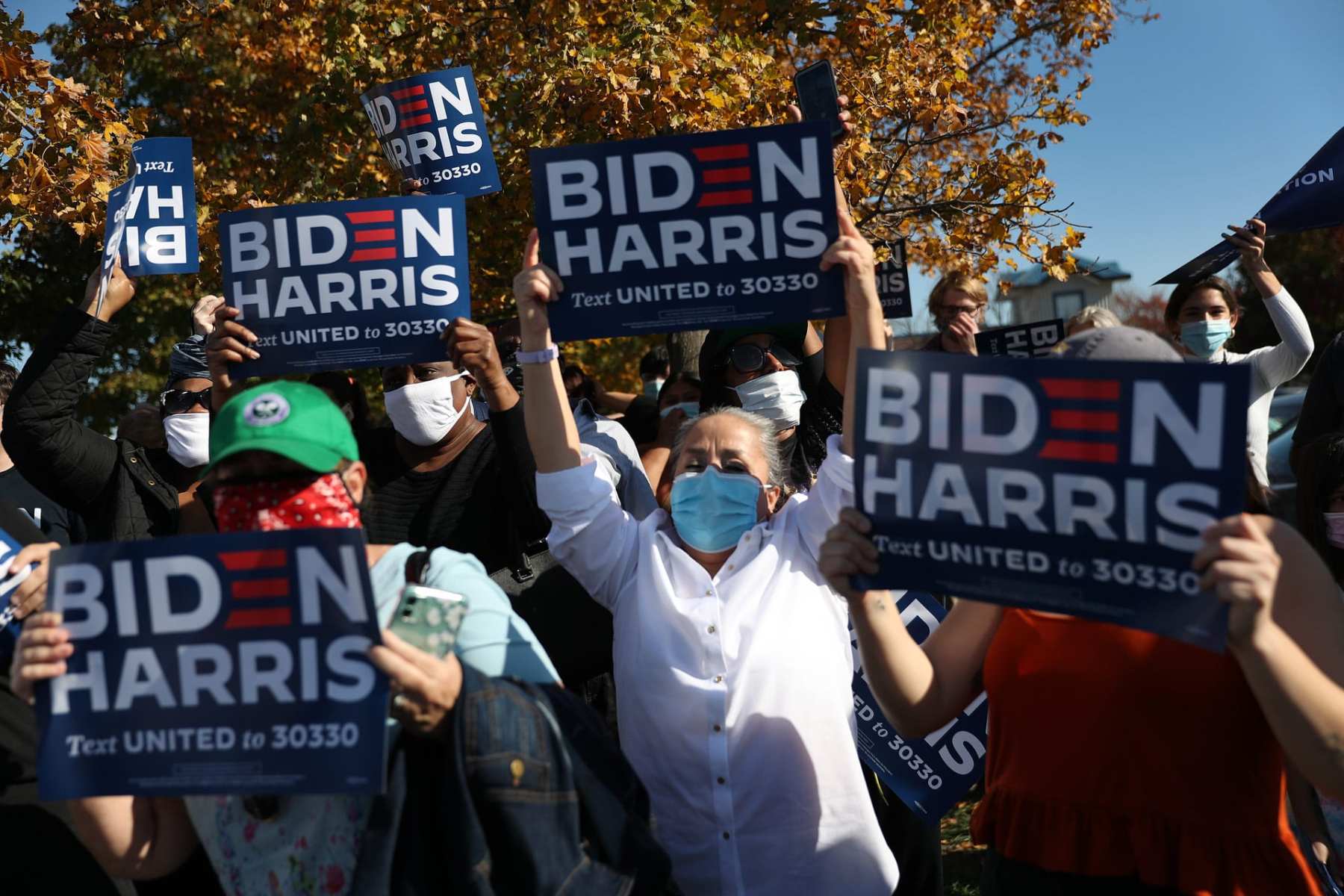We’re the only newsroom dedicated to writing about gender, politics and policy. Subscribe to our newsletter today.
On Saturday, the Associated Press and the major networks declared former Vice President Joe Biden and Sen. Kamala Harris victorious in their path to 270 electoral votes, making them the president and vice president-elect of the United States.
Harris made history by becoming the first woman, and the first Black and South Asian person, to be named to the second-highest office in the land, and The 19th spoke with voters about what her ascendency means to them.
Lourdes Orta got the text from a friend when the results came in that Biden was the projected winner. She replied: “First female vice president.”
Orta, a Miami Republican, had women’s rights on her mind when she cast her vote early for Biden. She voted for Democratic presidential nominee Hillary Clinton in 2016, and said she wanted to see the first woman elected to the vice presidency. “She’s sharp,” Orta, 57, said of Harris. “This is a smart person that I would like to have represent me and now that she is in this role, I am very, very excited.”
The friend who first broke the news to her, a coworker and member of the LGBTQ+ community, replied to her comment: “I can now be proud of my country again.”
Rep. Anna Eskamani, the first Iranian American in the Florida legislature, said it was an “incredible feeling” to have a woman in the White House.
Like Harris, Eskamani is the daughter of immigrants. Eskamani’s parents immigrated from Iran. Her father was an engineer who worked weekends at Walt Disney World to keep the family afloat. Eskamani’s mother worked at fast-food restaurants and in retail. She died in 2004 of colon cancer.
Harris’ mother, Shyamala Gopalan, also died of colon cancer in 2009.
“As a fellow daughter of immigrants, this is only something our ancestors dreamed about,” said Eskamani, a Democrat who represents Orlando. “I know her mom would be so proud of her.”
Vivian Davis Figures, who is one of only a handful of Black women currently serving in the 35-member Alabama State Senate, said her heart was “joyfully bursting with gratitude, pride and hope” when she saw the news of Biden and Harris’s victory.
“I’m grateful that I get to witness the first female, who just happens to be an African American, South Asian, become vice president of the United States of America,” the 63-year-old Democrat said. “I’m so proud of her, because she is a perfect example of what we as women of color can do, and become, just given the opportunity.”
Figures said Harris “exemplifies what can be for our little girls of color to see her, and believe that anything is possible.”
“Even for us women, older women of color, it gives us the inspiration to know that if we forge ahead, we can make a difference,” she said. “One can make a difference.”
“And, of course, I’m proud that she is my sorority sister,” said Figures, also a member of Alpha Kappa Alpha, Inc. “But she is a sister to all of us in one way or another, for she will bring stellar leadership that represents everyone.”
Gloria Butler, a Democrat who serves in the Georgia State Senate, said she has had her television on day and night since Election Day.
“I’ve been missing sleep, waking up early, just to hear whoever was going to make the announcement, to say it,” she said, adding that her neighbors probably heard her excitedly “yelling and screaming” when the networks called it.
Butler, a Black woman who was elected to the Senate in 1998, said she remembers the joy she felt when Barack Obama won the presidency in 2008. She is happy to see more progress on representation.
“I thought I’d never see a Black man go to the White House. I thought I’d never see a Black woman go to the White House,” said the 78-year-old. “And I’ve lived long enough to see both. It’s just like going myself.”
Jen Laws, a public policy consultant and trans man, had been preparing for the official call since Wednesday.
“My mind had already shifted to watching health care policy issues on the table — COVID and ending the HIV epidemic, which I hope to see Biden carry through on with more meaningful funding,” he told The 19th. Laws is already looking forward to a Biden administration that will restore Obama-era anti-discrimination protections for LGBTQ+ people.
Laws never changed his name from Jen, in part because he fears he could be arrested and detained with men for his advocacy work. The Trump administration has weakened regulations intended to keep transgender prisoners safe.
Because Laws never changed his name, he faced questioning from Louisiana poll workers on election day. Laws came prepared with his driver’s license, passport, birth certificate and current auto insurance to vote.
“I’m used to my name and the funny looks,” he said. “It seemed obvious to me they wanted to ask more, but the back-up from one poll worker discouraged that line of questioning.”
Laws was ultimately allowed to vote.
“I’m ecstatic,” said Shuchi Talati, a 33-year-old climate policy specialist in Washington, D.C. Talati, a registered Democrat said neither Biden nor Harris was her first choice in the Democratic primary. She had supported Sen. Elizabeth Warren, whose policies she felt were more in line with her own values. But she can’t overstate just how meaningful it is to see a woman — and a woman who, like her, has Indian ancestry — entering the White House.
“I’ve worked in the Senate before, I’ve worked in the White House. They were phenomenal places, but there weren’t a lot of women of color,” she said. “That a woman of color will lead an office and build a diverse staff to reflect what this country looks like is something I’m looking toward to seeing, and participating in.”
Talati’s parents immigrated from India, but she grew up in Texas. As a child, she said, she grew used to feeling “like the outlier.” Now, she said, she envisions a different future for her own children — a world where having a woman vice president isn’t an aberration, but a norm.
“The fact that we have a South Asian and Black woman as vice president means I’m not an outlier anymore,” she said.
Tapasya Wancho, 31, cried when Harris was announced as Biden’s running mate. And on Saturday morning, she cried again.
Wancho, who grew up in New York, has family from Kashmir. Her family is split in half on politics, she said. There are liberals, like her, but also conservatives. Her grandmother, who Wancho says voted for Biden and Harris reluctantly, also recognized the historic nature of the win. “‘If [Harris] can make it possible that you can be in office, I’m happy,’” Wancho recalled her grandmother saying. “For me, the moment with my grandmother was really special.”





